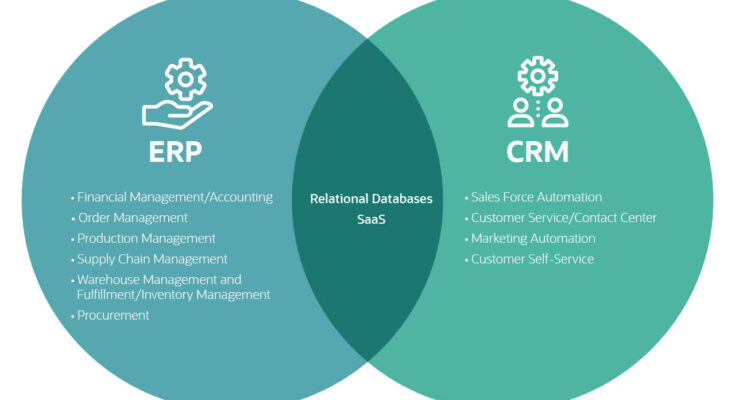ERP vs. CRM Systems: Understanding the Differences
Enterprise Resource Planning (ERP) and Customer Relationship Management (CRM) systems are two essential software solutions that play distinct but complementary roles within a business. While both systems focus on enhancing efficiency and productivity, they target different areas of an organization’s operations. In this article, we’ll delve into the key differences between ERP and CRM systems, and how they contribute to the success of modern businesses.
1. Defining ERP Systems:
ERP (Enterprise Resource Planning) systems are comprehensive software solutions designed to manage and optimize various business processes across an organization. These processes include finance, human resources, procurement, inventory, manufacturing, and more. ERP systems centralize data, streamline workflows, and facilitate data-driven decision-making.
2. Defining CRM Systems:
CRM (Customer Relationship Management) systems, on the other hand, are focused on managing interactions and relationships with customers and prospects. They provide tools to track customer data, manage sales pipelines, improve customer service, and enhance marketing efforts. CRM systems aim to create stronger customer relationships and improve customer satisfaction.
⇒Join us on Telegram for more Sure and Accurate football-winning tips every day...click here
3. Key Differences Between ERP and CRM Systems:
Focus and Purpose:
- ERP: Primarily focuses on internal processes and operations, aiming to optimize efficiency and reduce costs across various departments.
- CRM: Primarily focuses on external interactions with customers, prospects, and partners, aiming to improve customer satisfaction, sales, and marketing efforts.
Functional Areas:
- ERP: Covers a wide range of functional areas such as finance, human resources, procurement, inventory, manufacturing, and more.
- CRM: Primarily covers sales, marketing, and customer service functions, enhancing customer engagement and lead management.
Data Management:
- ERP: Manages data related to internal processes, including financial transactions, inventory levels, employee information, and production schedules.
- CRM: Manages customer-related data such as contact information, purchase history, communication logs, and interactions.
User Roles and Access:
- ERP: Involves users from various departments, including finance, operations, and HR, accessing specific modules based on their roles.
- CRM: Mainly involves sales, marketing, and customer service teams accessing customer data and interactions for targeted actions.
Integration and Collaboration:
- ERP: Integrates various departments’ data to provide a holistic view of the organization’s operations, facilitating collaboration.
- CRM: Integrates customer data, sales processes, and marketing campaigns to enhance collaboration among teams.
When to Implement ERP and CRM Systems:
- ERP: Implement an ERP system when your organization needs to streamline internal processes, improve data accuracy, and gain better insights into operations. This is particularly beneficial for businesses with complex supply chains and various departments.
- CRM: Implement a CRM system when your organization wants to enhance customer interactions, manage sales leads effectively, and create targeted marketing campaigns. CRM systems are crucial for businesses that prioritize customer satisfaction and engagement.
In the dynamic landscape of modern business, both ERP and CRM systems serve vital roles. While ERP systems optimize internal processes, CRM systems focus on external customer interactions. Implementing the right system or a combination of both can significantly contribute to increased efficiency, better decision-making, improved customer relationships, and overall business growth. Careful consideration of your organization’s needs and objectives will guide you toward selecting the most suitable solution.
Confused about which system to implement in your business? Learn about the key differences between ERP vs. CRM systems to make an informed decision. Read on for a comprehensive guide to understanding the features, implementation, pricing, and benefits of each system.
Enterprise Resource Planning (ERP) and Customer Relationship Management (CRM) are two essential software systems that help businesses manage their operations and customers. While these systems may seem similar at first glance, they serve different functions and offer distinct benefits. This article will explore the key differences between ERP and CRM systems.
ERP Systems?
ERP is a business management software that helps organizations manage and automate their day-to-day operations, such as accounting, inventory management, manufacturing, supply chain management, and more. ERP systems integrate data and processes across various departments, providing real-time visibility into the entire organization’s operations. ERP systems typically provide a centralized database, shared by all departments, which streamlines business processes and eliminates duplication of efforts.
CRM Systems?
CRM is a customer-focused software that helps businesses manage and improve their interactions with customers. CRM systems typically store customer data in a centralized database, such as contact information, purchase history, and customer interactions. This data is then used to provide a better customer experience, increase customer loyalty, and drive sales.
Key Differences Between ERP and CRM Systems
While both ERP and CRM systems offer many benefits, there are some key differences between them:
1. Scope of Functionality
The primary difference between ERP and CRM systems is the functionality they provide. ERP systems offer a comprehensive suite of tools to manage various business processes, including manufacturing, inventory management, accounting, and supply chain management. On the other hand, CRM systems focus on managing customer interactions, such as sales, marketing, and customer support.
2. Data Management
Another key difference between ERP and CRM systems is the type of data they manage. ERP systems manage data across the entire organization, including financial, manufacturing, and supply chain data. On the other hand, CRM systems focus on managing customer data, such as customer contact information, sales data, and marketing data.
3. Integration
ERP systems are designed to integrate with various other systems used in the organization, such as warehouse management systems, customer relationship management systems, and supply chain management systems. This integration ensures that data flows seamlessly across the organization. In contrast, CRM systems are typically standalone systems, and their integration is limited to other sales and marketing tools.
4. User Base
ERP and CRM systems also tend to have different user bases. ERP systems are typically used by a variety of departments across an organization, such as accounting, human resources, and supply chain management. CRM systems, on the other hand, are primarily used by sales, marketing, and customer service departments.
Benefits of ERP Systems
ERP systems offer several benefits, including:
Improved efficiency and productivity by automating business processes
Better financial management through real-time access to financial data
Improved inventory management and supply chain management
Better decision-making through real-time visibility into the organization’s operations
Streamlined business processes and elimination of duplication of efforts
Benefits of CRM Systems
CRM systems offer several benefits, including:
Improved customer satisfaction through personalized interactions and better customer service
Increased sales through better sales management and improved lead generation
Improved marketing effectiveness through better targeting and segmentation
Improved customer retention and loyalty through better engagement and follow-up
ERP vs. CRM: Which System is Right for Your Business?
When deciding whether to invest in an ERP or CRM system, it’s important to consider your business’s specific needs and goals. If your business is primarily focused on improving its operations and internal processes, an ERP system may be the best choice. On the other hand, if your business is primarily focused on improving its customer relationships and driving revenue growth, a CRM system may be the better option.
It is also worth considering whether your business may benefit from both systems. For example, a business that operates in the manufacturing industry may benefit from an ERP system to manage its operations and a CRM system to manage its customer relationships and sales.
In terms of pricing, ERP systems tend to be more expensive than CRM systems due to their wider scope of functionality. However, the specific pricing will depend on the vendor and the features included.
In terms of requirements, both ERP and CRM systems require careful planning and implementation to ensure success. Businesses should consider factors such as their current systems, data management processes, and user needs when selecting and implementing a system.
ERP vs. CRM: Differences in Implementation
One of the major differences between ERP and CRM systems is the implementation process. Implementing an ERP system typically involves a longer timeframe, as it requires extensive data mapping, customization, and integration with other systems. ERP systems are often implemented in phases, with each phase addressing specific business processes. The implementation process can take anywhere from several months to a few years, depending on the size and complexity of the organization and the system being implemented.
On the other hand, CRM systems are typically less complex and have a shorter implementation timeframe. This is because CRM systems are focused on specific business functions, such as sales, marketing, and customer service. Implementing a CRM system can take anywhere from a few weeks to a few months, depending on the size of the organization and the complexity of the system.
Integration requirements are another important factor in implementation. ERP systems often require extensive integration with other systems, such as warehouse management systems, logistics systems, and customer relationship management systems. This can be a complex process and may require the assistance of an experienced implementation team. CRM systems, on the other hand, are typically more self-contained and may require less integration.
ERP vs. CRM: Pricing Considerations
Pricing is another major consideration when evaluating ERP vs. CRM systems. Both types of systems have different pricing models, and the cost of ownership can vary significantly depending on the vendor and the system being implemented.
ERP systems are often priced using a perpetual licensing model, which requires an upfront payment for the software license. Additional costs may include customization, implementation, and maintenance fees. These costs can be significant, and organizations may need to invest in additional hardware and infrastructure to support the system.
CRM systems, on the other hand, are often priced using a subscription-based model. This model typically involves a monthly or annual fee, which includes the software license, maintenance, and support. Subscription-based pricing can be more flexible and easier to manage, as it allows organizations to scale up or down as needed.
Customization and integration costs are other important factors in pricing. ERP systems often require extensive customization and integration, which can add significant costs to the overall implementation. CRM systems are typically less complex and may require less customization and integration.
Conclusion: ERP and CRM Systems Are Complementary, Not Competing
In conclusion, it is important to understand that ERP and CRM systems are not competing technologies, but rather complementary ones. Each serves a different purpose in managing business operations and customer interactions, and they work together to provide a more complete and integrated view of a company’s overall performance.
ERP systems are designed to manage the back-office operations of a business, including inventory management, order processing, accounting, and manufacturing. They provide a holistic view of the entire business and allow companies to optimize their internal processes for greater efficiency and profitability.
On the other hand, CRM systems are focused on managing the front-office interactions between a company and its customers. They provide a centralized repository of customer data, allowing companies to better understand their customers’ needs and preferences, and to provide more personalized and targeted marketing and sales efforts.
While there may be some overlap between the functionalities of ERP and CRM systems, it is important to remember that each serves a distinct purpose. When implemented and used properly, they can work together to provide a more complete picture of a company’s performance and to help drive growth and profitability.
When it comes to deciding which system is right for your business, it is important to carefully consider your specific needs and requirements, as well as your budget and resources. ERP systems tend to be more complex and expensive to implement, while CRM systems are generally easier to set up and use.
Ultimately, the key to success is to choose a system that meets your specific business needs and objectives and to ensure that it is implemented and used effectively. With the right system in place, businesses can streamline their operations, improve customer satisfaction, and drive growth and profitability for years to come




